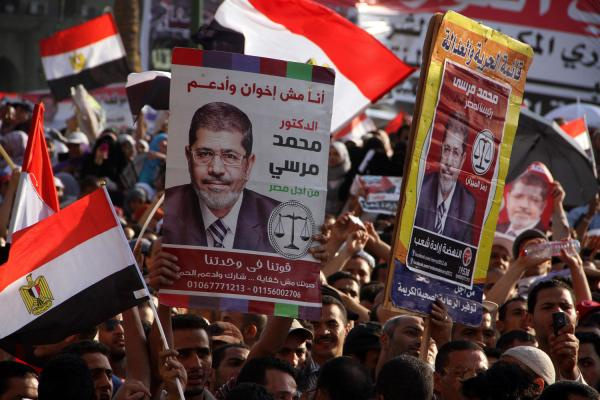|
After the announcement on Sunday of Mohammad Morsi's victory in Egypt's presidential elections, Cairo's Tahrir Square was filled with joy and excitement. The difference in the number of votes between Morsi, the Muslim Brotherhood's candidate, and his rival Ahmed Shafiq, the candidate from the former Mubarak regime, was so small that no one could predict the victor with certainty, even as the results were being read in a lengthy report by the election committee. The excitement prevailing in Tahrir Square during the reading of the results of the election was indicative of the fact that announcing Shafiq’s victory was expected.
After more than one and a half years since Mubarak's ouster, the only tangible result of the Egyptian revolution is the Muslim Brotherhood's achievement in gaining Mubarak's broken seat. Other achievements-- including victory in the Egyptian parliament of which 70 percent of the seats belonged to Islamists-- were dashed when the military dissolved the parliament. Moreover, the military changed the constitution and reduced the president's authority. The judiciary, the authority for lawmaking by the dissolved parliament and the Majlis in charge of drafting the new constitution are in the hands of the military. It should be underlined that power in Egypt is still in the hands of the military in which Mubarak was one of the generals. In the power game in Egypt, one side is the West, including the US, which has much influence in this country and the other side is the Muslim Brotherhood, which at present is the heir to the revolution. The third side is public opinion, which is showing itself in Tahrir Square. The military, as the heir to the previous regime, is the winner in these developments. All authority is left in the hands of the military which has only given the presidency, in a very weak form, to the Brotherhood.
The engineering of election results, with Morsi winning over Shafiq with only 2.5 percent, has important messages for the Brotherhood and revolutionaries. Of course, election engineering does not necessarily mean that there is election fraud, because with the presence of different players in the scene, this method is not a secure instrument to advance developments. The military paid close attention to the usually neglected fact during the excitement of revolutions that the revolution and people pouring into the streets do not necessarily mean conflict with all or a majority of the people. Parliamentary election results and the participation of about 50 percent of the people showed that a great section of Egyptian society is concerned about changes in this country. The engineering employed by the military capitalizing on this segment with the media, the political and financial instruments at hand, enabled it to move Shafiq, close to Morsi, forward. Many were worried about the coming to power of Shafiq and the fading away of the only hope for a change in the establishment as the result of a delicate and apparently legal game of the military. However, in that scenario, tension could once again return to the streets. Shafiq's mission was probably to lose to Morsi with 2 percent so that the Brotherhood becomes aware that it is not representing an overwhelming majority of the people and cannot expect the military to hand over all of the president's authorities under Mubarak to the winner of the election.
|


